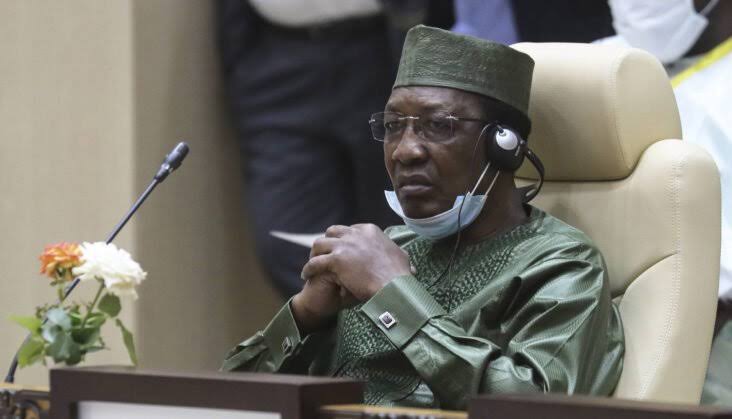N’DJAMENA, Chad (AP) — Chad’s longtime leader has died of wounds suffered during a visit to front-line troops battling a little-known rebel group, the military announced Tuesday, just hours after he was declared the winner of a an election that would have given him another six years in power.
The military quickly announced President Idriss Deby Itno’s son as the central African nation’s interim leader, succeeding his 68-year-old father who ruled for more than three decades.
Some observers immediately questioned the chain of events leading up to Tuesday’s stunning announcement on national radio and television.
Ayo Sogunro, a Nigerian lawyer and fellow at the South Africa-based Center for Human Rights, said that under Chadian law the term of an incumbent president who dies is completed not by family members but by the National Assembly.
“The army seizing power and conferring it on the son of the president … is a coup and unconstitutional,” Sogunro tweeted Tuesday, calling for the African Union to condemn the transfer of power.
Deby’s 37-year-old son, Mahamat, is best known as a top commander of the Chadian forces aiding a U.N. peacekeeping mission in northern Mali. The military said Tuesday he now will head an 18-month transitional council following his father’s death.
The military called for calm, instituting a 6 p.m. curfew and closing the country’s land and air borders as panic kept many inside their homes in the capital, N’Djamena.
“In the face of this worrying situation, the people of Chad must show their commitment to peace, to stability, and to national cohesion,” Gen. Azem Bermandoa Agouma said.
The circumstances of Deby’s death could not immediately be independently confirmed due to the remote location of the fighting. The government has released few details of its efforts to put down the rebellion in northern Chad. The army said Tuesday that Deby had fought heroically but was wounded in a battle. He was then taken to the capital where he later died of unspecified wounds.
Some residents of the capital, though, said they feared there was more to the story of Deby’s demise.
“The rumors that are going around about the transitional council give me the impression that some information is false,” Thierry Djikoloum said. “They are already talking about dissolving parliament … So for me, I’d say it was a coup d’etat. He was killed.”
Some foreign observers also questioned how a head of state could have been killed, saying it cast doubt on his protective guard. The Chadian military has only acknowledged five deaths in weekend fighting in which it said it killed 300 rebels.
“We still don’t have the whole story,” Laith Alkhouri, a global intelligence adviser, told The Associated Press. “It raises concerns regarding the security forces’ assessment of the clashes and their intelligence regarding the severity of the situation.”
Other analysts pointed to Deby’s long history of visiting the battlefield as a former army commander-in-chief himself.
“There’s no evidence to suggest this was a coup committed by his troops. Anyone who follows Deby knows he used to say ‘to lead troops you have to smell the gunpowder,’” tweeted Cameron Hudson with the Atlantic Council’s Africa Center.
Deby was a major French ally in the fight against Islamic extremism in Africa, hosting the base for the French military’s Operation Barkhane and supplying critical troops to the peacekeeping effort in northern Mali.
The French presidency called Deby “a courageous friend” in a statement Tuesday.
Chad is losing “a great soldier and a president who worked non-stop for the security of the country and the stability of the region for three decades,” it said.
Deby first came to power in 1990 when his rebel forces overthrew then-President Hissene Habre, who was later convicted of human rights abuses at an international tribunal in Senegal.
Over the years Deby had survived numerous armed rebellions and managed to stay in power until this latest insurgency led by a group calling itself the Front for Change and Concord in Chad.
The rebels are believed to have armed and trained in neighboring Libya before crossing into northern Chad on April 11. Their arrival came on the same day that Chad’s president sought a sixth term in an election several top opposition candidates boycotted.
___
Larson reported from Dakar, Senegal. Associated Press writer Sam Mednick in Ouagadougou, Burkina Faso; Cara Anna in Nairobi, Kenya; and Sylvie Corbet in Paris contributed.














